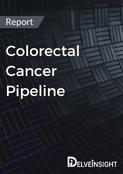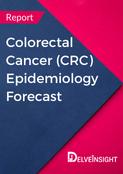Colorectal Cancer Pipeline
DelveInsight’s, “Colorectal Cancer - Pipeline Insight, 2025,” report provides comprehensive insights about 195+ companies and 200+ pipeline drugs in Colorectal Cancer pipeline landscape. It covers the pipeline drug profiles, including clinical and nonclinical stage products. It also covers the therapeutics assessment by product type, stage, route of administration, and molecule type. It further highlights the inactive pipeline products in this space.
Geography Covered
- Global coverage
Colorectal Cancer Understanding
Colorectal Cancer: Overview
Colorectal cancer (CRC) is a disorder that occurs exclusively in the colon or rectum and is caused by the colon’s aberrant proliferation of glandular epithelial cells. There are three principal types of CRC: sporadic, hereditary, and colitis-associated. The number of CRC cases is increasing globally day by day. Both environmental and genetic factors determine the risk of developing CRC. In addition, the risk of developing CRC in patients with long-standing ulcerative colitis and Crohn’s disease increases with age. Multiple studies have demonstrated that risk factors for CRC include diet and lifestyle, family history, and chronic inflammation.
CRC is a multifactorial disease. The epithelial cells of colorectal mucosa can undergo hyperplasia, atypical hyperplasia (mild, moderate, or severe), and adenomas that can eventually develop into carcinoma. This process is usually initiated by carcinogenic factors, causing structural changes in DNA and leading to the malignant transformation of cells into cancer. Morphology includes epithelial hyperplasia, atypical hyperplasia, adenoma formation, carcinoma in situ, and invasive carcinoma. In 1990, Fearon and Vogelstein proposed a molecular event model for the occurrence and development of CRC. With the development of research, three molecular mechanisms related to the occurrence and development of CRC have been confirmed: (i) chromosomal instability that mainly occurs in FAP; (ii) genetic mutations such as in Lynch syndrome and other sporadic MMR mutations; and (iii) hypermethylation of CPG islands in specific gene promoter regions. These processes are often associated with abnormal changes in multiple genes such as APC, DCC, P53, K-ras, c-MYC, MCC, and MMR-related genes (hMLH1, hMLH3, hMSH2, hMSH3, hMSH6, hPMS1, and hPMS2). It is worth noting that these abnormal molecular signaling pathways are not mutually exclusive, and multiple abnormal molecular pathways are co-existing in some CRC patients.
Colorectal cancer (cancer of the colon or rectum) is very treatable when it is discovered early. Even if it spreads into nearby lymph nodes, surgical treatment followed by chemotherapy is very effective. In the most advanced cases — when the cancer has spread to the liver, lungs, or other sites — treatment can often make surgery an option, and can prolong and add to quality of life. The application of molecularly targeted drugs has brought significant benefits to CRC patients. Currently, molecularly targeted drugs are used in the clinical treatment of CRC. Clinically, molecular-targeted drugs are recommended to be used in combination with chemotherapeutic drugs because they are non-cytotoxic drugs and have relatively mild adverse reactions, which generally do not significantly increase the adverse reactions of chemotherapy. Recent studies have shown that immunotherapy can prolong survival in CRC patients.
"Colorectal Cancer - Pipeline Insight, 2025" report by DelveInsight outlays comprehensive insights of present scenario and growth prospects across the indication. A detailed picture of the Colorectal Cancer pipeline landscape is provided which includes the disease overview and Colorectal Cancer treatment guidelines. The assessment part of the report embraces, in depth Colorectal Cancer commercial assessment and clinical assessment of the pipeline products under development. In the report, detailed description of the drug is given which includes mechanism of action of the drug, clinical studies, NDA approvals (if any), and product development activities comprising the technology, Colorectal Cancer collaborations, licensing, mergers and acquisition, funding, designations and other product related details.
Unlock comprehensive insights! Click Here to Purchase the Full Report @ Colorectal Cancer Prevalence
Report Highlights
The companies and academics are working to assess challenges and seek opportunities that could influence Colorectal Cancer R&D. The therapies under development are focused on novel approaches to treat/improve Colorectal Cancer.
Colorectal Cancer Emerging Drugs Chapters
This segment of the Colorectal Cancer report encloses its detailed analysis of various drugs in different stages of clinical development, including phase II, I, preclinical and Discovery. It also helps to understand clinical trial details, expressive pharmacological action, agreements and collaborations, and the latest news and press releases.
Colorectal Cancer Emerging Drugs
XL092 : Exelixis
XL092 is an investigational small molecule, oral tyrosine kinase inhibitors (TKI) that inhibits the activity of receptor tyrosine kinases involved in cancer growth and spread, including VEGF receptors, MET, AXL and MER. These receptor tyrosine kinases are involved in both normal cellular function and in pathologic processes like oncogenesis, metastasis, and tumor angiogenesis. Currently it is in Phase III stage of clinical trial evaluation to treat Colorectal Cancer.
Adagrasb : Mirati Therapeutics
Adagrasib is an investigational, highly selective, and potent oral small-molecule inhibitor of KRASG12C that is optimized to sustain target inhibition, an attribute that could be important to treat KRASG12C-mutated cancers. The drug candidate is being evaluated as monotherapy and in combination with other anti-cancer therapies in patients with advanced KRASG12C-mutated colorectal cancer. Currently being evaluated in the Phase III studies.
Olaparib : Merck Sharp & Dohme LLC/Astrazeneca
Olaparib is an investigational is a first-in-class Poly (ADP-ribose) polymerase PARP inhibitors and the first targeted treatment that potentially exploit DNA damage response (DDR) pathway deficiencies, like BRCA mutations, to preferentially kill cancer cells. Olaparib is being jointly developed and commercialized by AstraZeneca and Merck. Currently the drug is being evaluated in Phase III for the treatment of Colorectal Cancer.
DS-8201: Daiichi Sankyo
DS-8201 a proprietary antibody-drug conjugate (ADC) is a smart chemotherapy comprised of a humanized HER2 antibody attached to a novel topoisomerase I inhibitor payload by a tetra peptide-based linker. It is designed to target and deliver chemotherapy inside cancer cells and reduce systemic exposure to the cytotoxic payload (or chemotherapy) compared to the way chemotherapy is commonly delivered. The drug is been developed in collaboration with AstraZeneca. The drug is in Phase II stage of clinical trials.
Ompenaclid: Inspirna
Ompenaclid is a first in class oral small molecule inhibitor of the creatine transport channel SLC6A8 a novel target that is enriched under hypoxic conditions and provides tumor cells with an additional energy source. Ompenaclid triggers tumor regressions in CRC patients by inducing apoptosis of tumor cells. It is based on Rgenix technology. The drug is in Phase II stage of clinical trials.
LYL845: Lyell Immunopharma
LYL845, an autologous tumor-infiltrating lymphocytes (TIL). It is administered through the intravenous route. It is being developed based on an ex vivo epigenetic reprogramming (Epi-R) technology platform is currently being investigated in a Phase 1 clinical trial in patients suffering with relapsed or refractory metastatic colorectal cancer.
RG6286: Genentech
RG6286 (BLYG-8824A) is under development for the treatment of relapsed or refractory, advanced, or metastatic colorectal cancer. It is new chemical entity, administered through an intravenous route currently being investigated in a Phase 1 clinical trial.
Stay ahead with updates on our promising Colorectal Cancer Therapies. Dive into our pipeline progress now @ Colorectal Cancer Drugs Market
Colorectal Cancer: Therapeutic Assessment
This segment of the report provides insights about the different Colorectal Cancer drugs segregated based on following parameters that define the scope of the report, such as:
Major Players in Colorectal Cancer
There are approx. 195+ key companies which are developing the therapies for Colorectal Cancer. The companies which have their Colorectal Cancer drug candidates in the most advanced stage, i.e. phase III include, Exelixis
Phases
DelveInsight’s report covers around 200+ products under different phases of clinical development like
- Late stage products (Phase III)
- Mid-stage products (Phase II)
- Early-stage product (Phase I) along with the details of
- Pre-clinical and Discovery stage candidates
- Discontinued & Inactive candidates
Route of Administration
Colorectal Cancer pipeline report provides the therapeutic assessment of the pipeline drugs by the Route of Administration. Products have been categorized under various ROAs such as
- Oral
- Intravenous
- Subcutaneous
- Parenteral
- Topical
Molecule Type
Products have been categorized under various Molecule types such as
- Recombinant fusion proteins
- Small molecule
- Monoclonal antibody
- Peptide
- Polymer
- Gene therapy
Product Type
Drugs have been categorized under various product types like Mono, Combination and Mono/Combination.
Colorectal Cancer: Pipeline Development Activities
The report provides insights into different therapeutic candidates in phase II, I, preclinical and discovery stage. It also analyses Colorectal Cancer therapeutic drugs key players involved in developing key drugs.
Pipeline Development Activities
The report covers the detailed information of collaborations, acquisition and merger, licensing along with a thorough therapeutic assessment of emerging Colorectal Cancer drugs.
Colorectal Cancer Report Insights
- Colorectal Cancer Pipeline Analysis
- Therapeutic Assessment
- Unmet Needs
- Impact of Drugs
Colorectal Cancer Report Assessment
- Pipeline Product Profiles
- Therapeutic Assessment
- Pipeline Assessment
- Inactive drugs assessment
- Unmet Needs
Key Questions
Current Treatment Scenario and Emerging Therapies:
- How many companies are developing Colorectal Cancer drugs?
- How many Colorectal Cancer drugs are developed by each company?
- How many emerging drugs are in mid-stage, and late-stage of development for the treatment of Colorectal Cancer?
- What are the key collaborations (Industry–Industry, Industry–Academia), Mergers and acquisitions, licensing activities related to the Colorectal Cancer therapeutics?
- What are the recent trends, drug types and novel technologies developed to overcome the limitation of existing therapies?
- What are the clinical studies going on for Colorectal Cancer and their status?
- What are the key designations that have been granted to the emerging drugs?
Also, Read @ Latest DelveInsight Blogs



